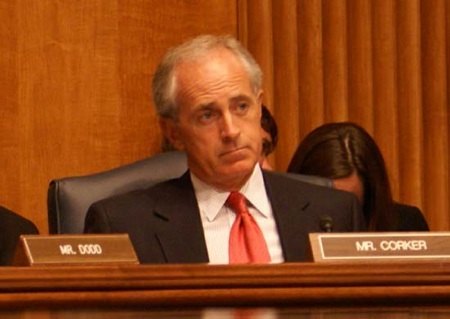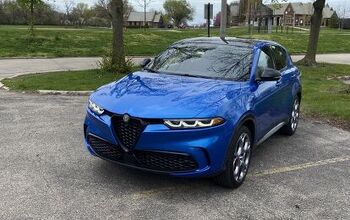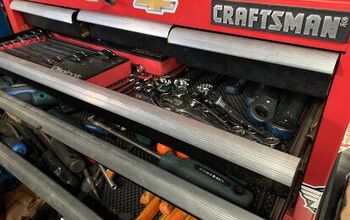Freep to Corker: GOTCHA!
Fair enough. At the congressional bailout hearings, Tennessee Senator Robert Corker gave Chrysler and GM CEOs major NSFW for running their business with all the efficiency of a federal agency. (And Corker should know.) We haven’t seen such public humiliation of powerful people since the Kefauver Committee raked the mob over the coals in 1950/51. Yes, well, who’s crying now? GM’s Spring Hill plant is on Corker’s patch; as we reported earlier it’s running at 24 percent of capacity (building the fourth Lambda platform Chevy Traverse). Corker knows the Presidential Task Force on Automobiles has the ex-Saturn plant in its sights; he’s claiming it makes rational business sense to keep Spring Hill open. Yeah, right. And good on the Detroit Free Press for not gloating. “This week, Sen. Bob Corker of Tennessee continued his campaign to keep Spring Hill open, saying if politics is left out of the equation by the Obama administration, as he hopes, the plant and its 3,000 workers should survive. The evidence to the contrary is significant . . .”
A newer plant in Lansing is already producing three other vehicles on that same platform. And Lansing is much closer to suppliers than Tennessee.
Add to that the fact that larger trucks, SUVs and CUVs like the Traverse could take a hit if Obama’s auto team demands a more aggressive move to fuel-efficient sedans.
Uh-huh.
In fairness to Corker, Obama already has gone so far as to force GM’s Rick Wagoner out as CEO. But there’s no indication the White House intends to decide specifically which plants stay open or close — or that if it does so, politics, such as whether a state voted for Obama or not or the sway of a given state’s congressional delegation with the administration, would play a role.
An administration official dismissed the notion this week.
Melanie Sloan, executive director of Citizens for Responsibility and Ethics in Washington, said it’s more likely members of Congress will try to protect plants in their districts through earmarks or legislation.
“Corker’s just assuming the president is doing what he would do,” she said. “The president has wider concerns.”
Zing!
More by Robert Farago
Latest Car Reviews
Read moreLatest Product Reviews
Read moreRecent Comments
- Jalop1991 In a manner similar to PHEV being the correct answer, I declare RPVs to be the correct answer here.We're doing it with certain aircraft; why not with cars on the ground, using hardware and tools like Telsa's "FSD" or GM's "SuperCruise" as the base?Take the local Uber driver out of the car, and put him in a professional centralized environment from where he drives me around. The system and the individual car can have awareness as well as gates, but he's responsible for the driving.Put the tech into my car, and let me buy it as needed. I need someone else to drive me home; hit the button and voila, I've hired a driver for the moment. I don't want to drive 11 hours to my vacation spot; hire the remote pilot for that. When I get there, I have my car and he's still at his normal location, piloting cars for other people.The system would allow for driver rest period, like what's required for truckers, so I might end up with multiple people driving me to the coast. I don't care. And they don't have to be physically with me, therefore they can be way cheaper.Charge taxi-type per-mile rates. For long drives, offer per-trip rates. Offer subscriptions, including miles/hours. Whatever.(And for grins, dress the remote pilots all as Johnnie.)Start this out with big rigs. Take the trucker away from the long haul driving, and let him be there for emergencies and the short haul parts of the trip.And in a manner similar to PHEVs being discredited, I fully expect to be razzed for this brilliant idea (not unlike how Alan Kay wasn't recognized until many many years later for his Dynabook vision).
- B-BodyBuick84 Not afraid of AV's as I highly doubt they will ever be %100 viable for our roads. Stop-and-go downtown city or rush hour highway traffic? I can see that, but otherwise there's simply too many variables. Bad weather conditions, faded road lines or markings, reflective surfaces with glare, etc. There's also the issue of cultural norms. About a decade ago there was actually an online test called 'The Morality Machine' one could do online where you were in control of an AV and choose what action to take when a crash was inevitable. I think something like 2.5 million people across the world participated? For example, do you hit and most likely kill the elderly couple strolling across the crosswalk or crash the vehicle into a cement barrier and almost certainly cause the death of the vehicle occupants? What if it's a parent and child? In N. America 98% of people choose to hit the elderly couple and save themselves while in Asia, the exact opposite happened where 98% choose to hit the parent and child. Why? Cultural differences. Asia puts a lot of emphasis on respecting their elderly while N. America has a culture of 'save/ protect the children'. Are these AV's going to respect that culture? Is a VW Jetta or Buick Envision AV going to have different programming depending on whether it's sold in Canada or Taiwan? how's that going to effect legislation and legal battles when a crash inevitibly does happen? These are the true barriers to mass AV adoption, and in the 10 years since that test came out, there has been zero answers or progress on this matter. So no, I'm not afraid of AV's simply because with the exception of a few specific situations, most avenues are going to prove to be a dead-end for automakers.
- Mike Bradley Autonomous cars were developed in Silicon Valley. For new products there, the standard business plan is to put a barely-functioning product on the market right away and wait for the early-adopter customers to find the flaws. That's exactly what's happened. Detroit's plan is pretty much the opposite, but Detroit isn't developing this product. That's why dealers, for instance, haven't been trained in the cars.
- Dartman https://apnews.com/article/artificial-intelligence-fighter-jets-air-force-6a1100c96a73ca9b7f41cbd6a2753fdaAutonomous/Ai is here now. The question is implementation and acceptance.
- FreedMike If Dodge were smart - and I don't think they are - they'd spend their money refreshing and reworking the Durango (which I think is entering model year 3,221), versus going down the same "stuff 'em full of motor and give 'em cool new paint options" path. That's the approach they used with the Charger and Challenger, and both those models are dead. The Durango is still a strong product in a strong market; why not keep it fresher?


































Comments
Join the conversation
There's a saying about politicians: where they stand depends on where they sit. And in all fairness to Coker, his constituents (a.k.a. voters) almost surely simultaneously hold contradictory ideas as well: cut spending while spending more for any program I like. Another reason to hand the GM mess over to a bankruptcy judge.
In the end everyone loves it when money comes to town from another part of the country. Human nature is to take the free cheese. Many people profess to being above this petty stuff but if you're looking at no job, selling your house and everything in it, and moving in with relatives next year, you'll take whatever you can get. Even running a plant at 1/4 capacity making widgets.